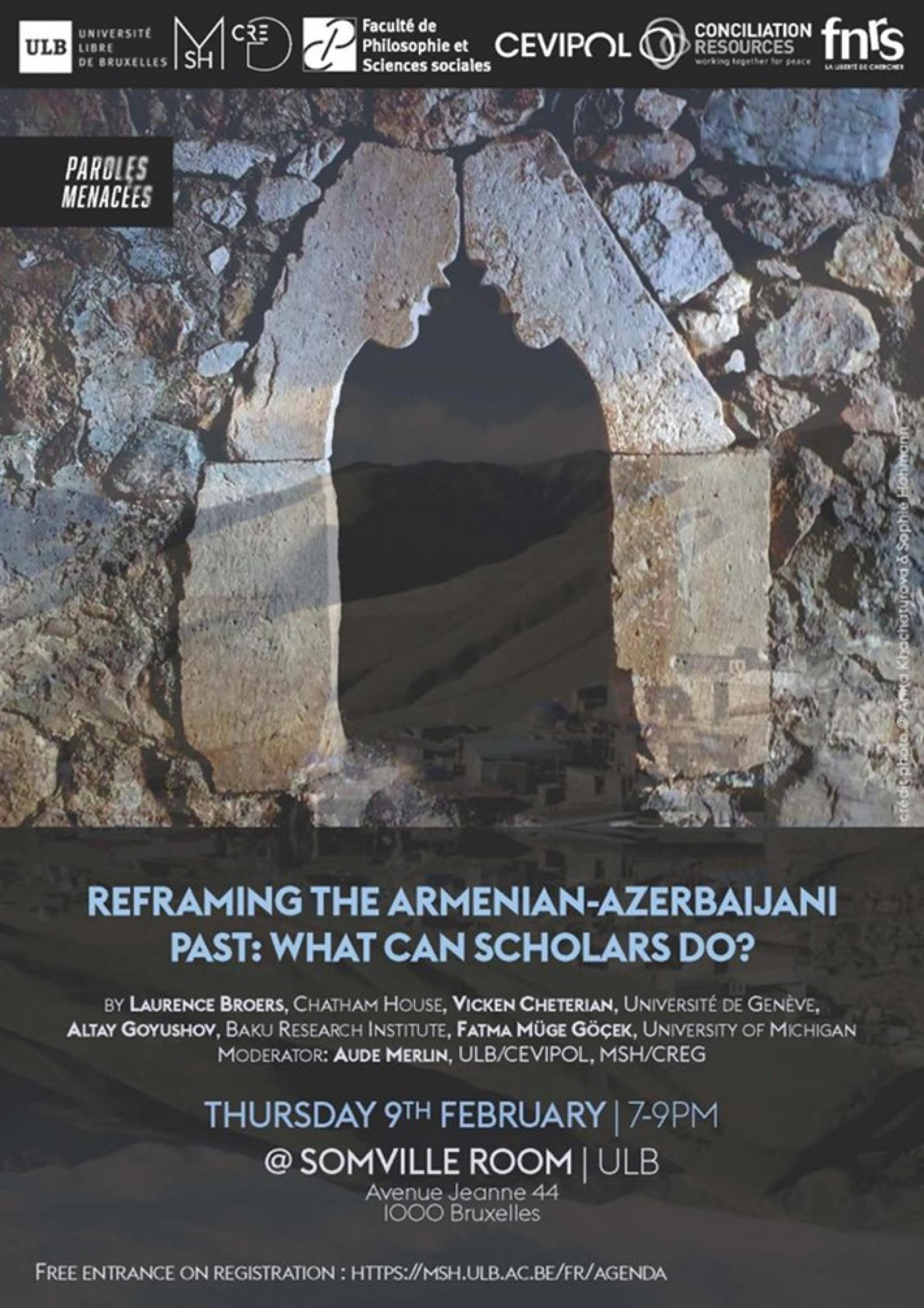Bridging the Armenian and Azerbaijani divide: the role of academia in reframing conflictual narratives
As tensions mount in the Caucasus, academic scholars discuss how to redefine the enduring conflictual narrative on the relations between Baku and Yerevan

I. The initiative: Bridging conflicting communities through academic dialogue
On the 8th, 9th, and 10th of February, a network of Armenian and Azerbaijani scholars, with the support of the Centre d’Etudes de la Vie Politique of the Université Libre de Bruxelles and the financial support of the Sigrid Rausing Trust via Conciliation Resources, organized a public event dedicated to the role of academia in reframing the Armenian-Azerbaijani relations.
The management of the initiative was coordinated by Professor Aude Merlin (ULB), Vicken Cheterian (Université de Genève), Altay Goyushov (Baku Research Institute), Laurence Broers (Conciliation Resources/Chatham House) and a team of ULB researchers, including the GEM-Diamond Fellow Mr. Luigi Nicolo Segarizzi.
Specifically, the aim of the event was to bring together Armenian and Azerbaijani scholars to debate what is today the conflictual relationship between the two countries with rigorous academic parameters. During a three-day workshop, all participants presented their research projects covering a wide spectrum of aspects such as the role of emotions in the Nagorno-Karabakh conflict, different societal narratives on the regional situation, the shared Soviet past, and the construction of national identities.
The public conference “Reframing the Armenian-Azerbaijani Past: What can scholars do?”, which took place at the ULB, involved more than 120 attendants. During the event, the coordination board and Professor Fatma Müge Göçek (University of Michigan), discussed the critical role that academia plays in the genesis and onset of the Armenian-Azerbaijani conflict. Specific insights addressed the action of intellectuals to transform the conflict, the lessons learned from similar efforts to bridge the Armenian-Turkish divide, and the impact of the overall global and regional tensions on Armenian-Azerbaijani relations.
Ultimately, the project demonstrated the possibility to reframe the narrative of relations in the South Caucasus under a non-conflictual perspective through the prism of academic dialogue. In this regard, debates among scholars are a pivotal element in re-defining the Armenian-Azerbaijani relations by looking at shared views of the past.
II. Key takeovers from the discussion: the pivotal role of societal perceptions
In the runup to the collapse of the USSR in the late 80s and early 90s, Azerbaijan and Armenia embarked on a harsh war over the Nagorno-Karabakh Autonomous Oblast (NKAO). Since 1994, the self-governed region remained under Armenian control but was affected by a precarious situation of ‘unresolved conflict’ with recurrent skirmishes. The revived outbreak of open hostilities in 2020 was marked by the Azerbaijani victory but paved the way to protracted instability in the area. Following the Trilateral agreement meditated by Moscow, in the region was deployed a Russian military contingent while the European Union launched recently a civilian mission for monitoring border tensions between the two countries.
In this context, the initiative hosted at the ULB gave the possibility to reflect upon the rooted causes of the long-standing confrontation in the South Caucasus through the presentation of a collection of thematically diverse research papers. During the event emerged the pressing necessity to increase the focus on societal perceptions, an aspect too often underestimated in mainstream analyses. Almost all participants agreed that, both in Armenia and in Azerbaijan, the recent conflict exacerbated the stigmatization of the neighboring population as an existential threat. This worrisome vision of the ‘other’ as an enemy of the fatherland has penetrated so deeply in the respective societies that now seems an inextricable part of their national identities. Interestingly, different scholars shed light on the growing generational divide concerning perceptions on the issue. While older generations generally perceive the neighbor as a military adversary but they still remember the common Soviet heritage, youth appears to be more polarized between those willing to find common ground and the ones more prone to the stigmatization of the neighboring community as an existential rival. The exposure to hate speech, disinformation, and propaganda in social media or even in mainstream channels has been recognized as an important driver of such extreme perceptions. Consequently, the debate underlined the pressing need to ensure a protected space where differing perspectives could be reconciled through scholarly dialogue to openly discuss the evolving dynamics of the conflictual relationship. Ensuring safe spaces for inter-societal dialogue is indeed an essential element to rigorously investigate and redefine historically tense relations. A clear example in this regard is the support provided by the European Union to the normalization of relations between Armenia and Turkey, which required years of exchanges between Civil Society Organizations (CSOs), journalists, and students.
By addressing complex socio-political divides from different academic prospectives, the initiative also provided some useful inputs for the research activity conducted in the framework of Work Package 4 of the GEM-DIAMOND program. The efforts by different scholars to unpack the impact of societal perceptions in long-standing conflictual relations have proven to be particularly relevant in the context of the research project ESR 13, which is dedicated to the effectivity of European mechanisms for peace support and stabilization.
